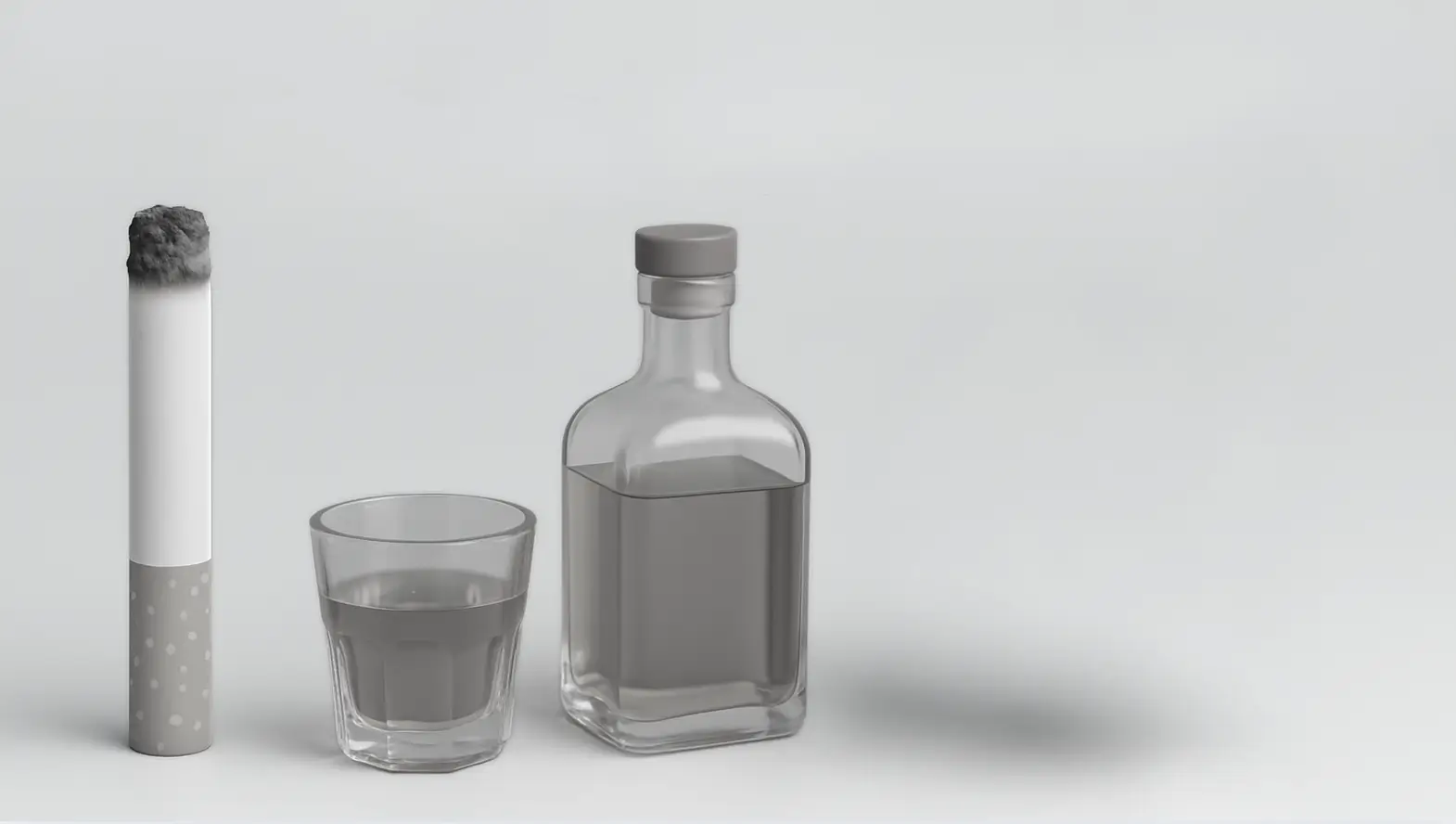When preparing for a hair transplant at Ideal of MeD, most patients focus on the surgery itself—choosing the right clinic, understanding the technique, and planning recovery. But what you do before and after the procedure is just as important as the surgery itself.
In particular, your lifestyle habits—such as drinking alcohol and smoking—can significantly affect how well your hair transplant heals and how successful the results will be. Below, we explain how these habits impact your recovery and graft survival, and what Ideal of MeD recommends for the best possible outcome.
Why Lifestyle Matters in Hair Restoration
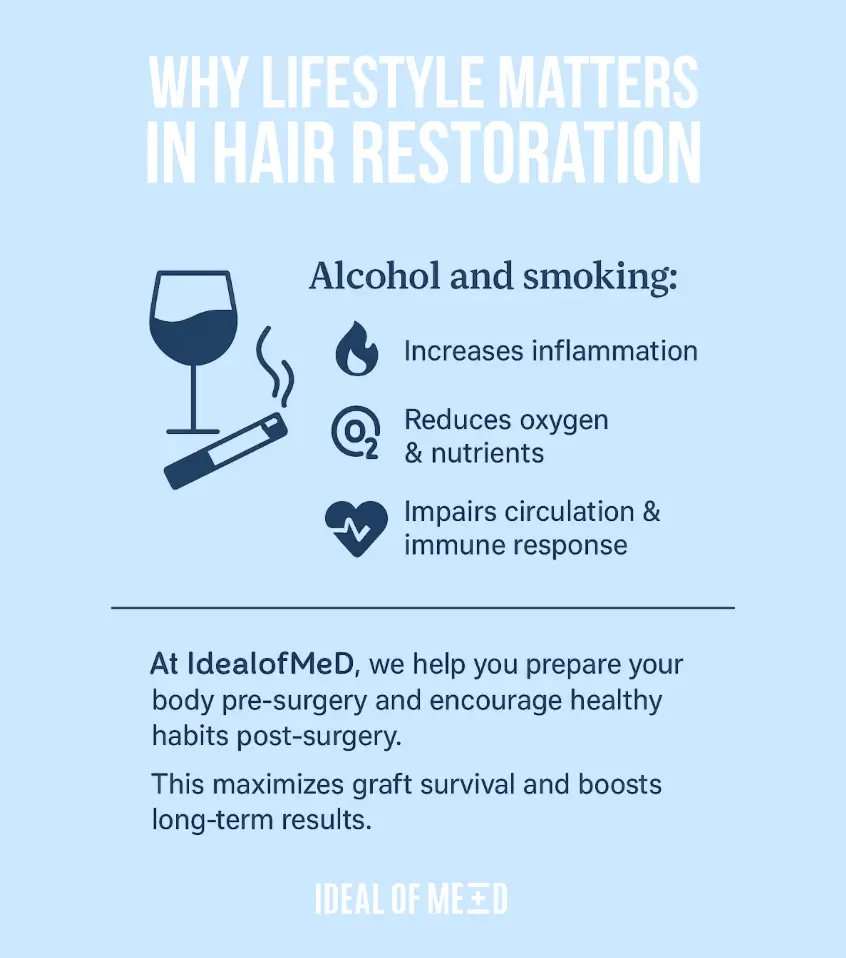
A hair transplant is more than a cosmetic procedure—it’s a surgery and a regenerative process. Your body needs ideal internal conditions to heal wounds, regenerate tissue, and support new hair growth.
However, both alcohol and smoking disrupt this process by increasing inflammation, reducing oxygen and nutrient flow and impairing circulation and immune response.
That’s why at Ideal of MeD, we emphasize the importance of preparing your body pre-surgery and maintaining healthy habits post-surgery. This approach helps maximize graft survival and long-term results.
Alcohol & Hair Transplants: What’s the Risk?
Even moderate alcohol use can impair recovery. Here’s how:
1. Dehydration = Poor Skin Condition
Alcohol is a diuretic, meaning it dehydrates the body. This leads to dry, less elastic scalp skin—affecting healing and increasing the risk of complications post-surgery.
2. Thinner Blood, More Bleeding
Alcohol thins your blood, which can:
- Increase bleeding during surgery
- Make precise graft placement more difficult
- Lead to excessive scabbing, redness, or swelling during recovery
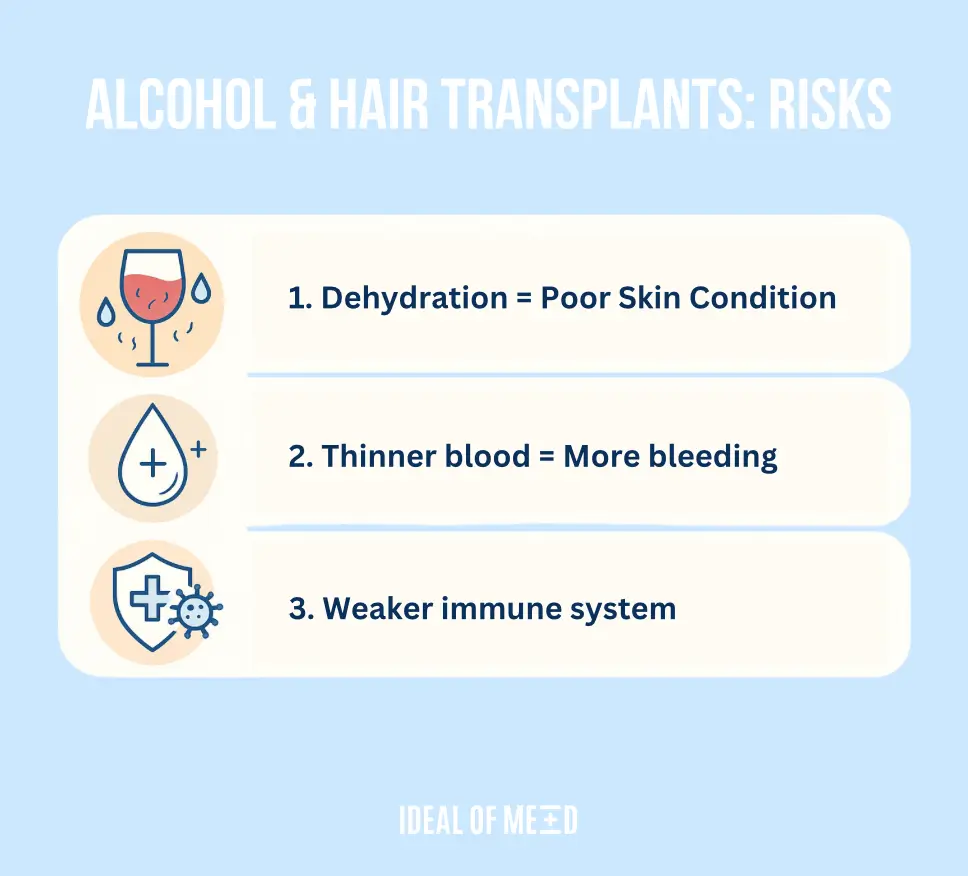
3. Weakened Immune System
Alcohol impairs immune function, which raises your risk of infections, especially during the first few days after surgery when your scalp is most vulnerable.
Ideal of MeD on Alcohol
Alcohol doesn’t just affect your liver — it has a direct impact on your gut microbiome, which plays a crucial role in your overall health, including hair growth and recovery after a transplant.
When you consume alcohol, it acts like a sterilizing agent inside your gut, disrupting the balance of beneficial bacteria. These microbes are essential for:
- Producing serotonin, which supports mental well-being
- Maintaining a strong immune system
- Facilitating the absorption and metabolism of nutrients
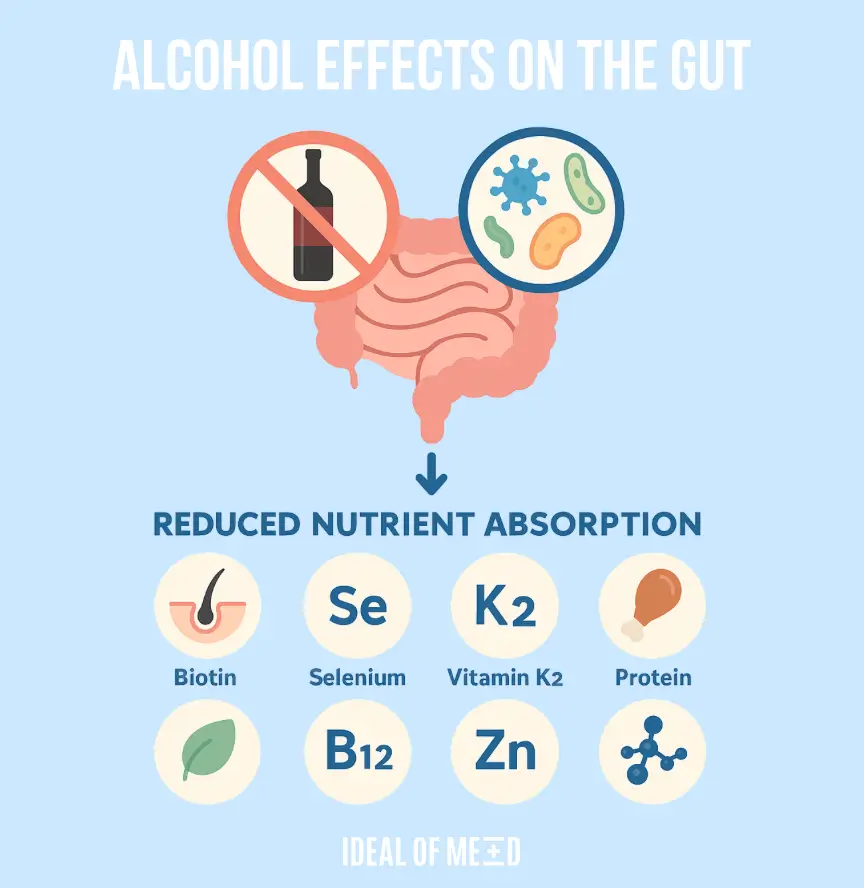
If your gut microbiome is compromised or your intestinal lining becomes inflamed due to alcohol, your body struggles to absorb key nutrients vital for hair health, including:
- Biotin
- Selenium
- Vitamin K2
- Protein
- Folate
- Vitamin B12
- Zinc
- Iron
- Short-chain fatty acids
Without these nutrients, your body may develop deficiencies that weaken hair follicles, slow healing, and even trigger hair loss — all of which can jeopardize your hair transplant results.
Ideal of MeD’s Take:
- Stop drinking alcohol at least 30 days before your hair transplant
- Avoid alcohol for at least 30 days after your procedure
- For optimal long-term results, consider reducing or eliminating alcohol entirely in the months following your transplant
Your hair follicles are only as healthy as the environment you create for them. Protecting your gut and staying well-nourished gives your new hair the best chance to grow strong and stay put.
Smoking & Hair Transplants: A Bigger Concern
Smoking is one of the most damaging habits for both natural hair health and hair transplant recovery.
1. Vasoconstriction: Cutting Off Circulation
Nicotine causes your blood vessels to constrict. That means less oxygen and fewer nutrients reach your scalp—exactly when your new grafts need them most.
2. Impaired Graft Survival
Even if your surgery goes perfectly, smoking may cause:
- Increased graft failure
- Poor anchoring of hair follicles
- Stunted or patchy regrowth
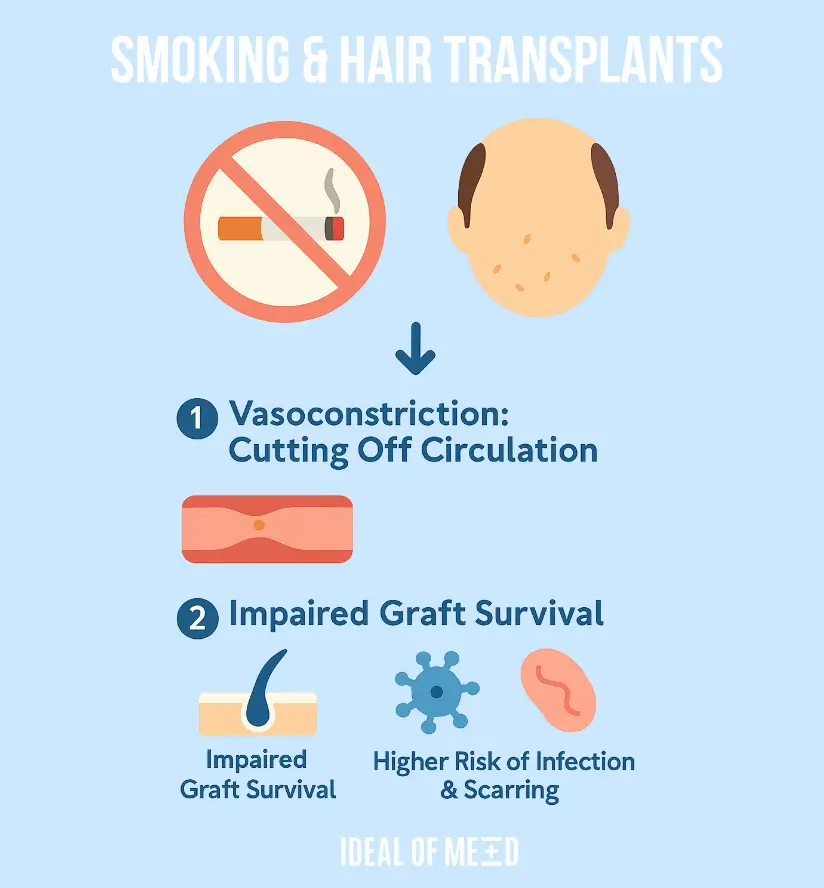
3. Higher Risk of Infection & Scarring
The toxins in cigarette smoke:
- Slow down wound healing
- Increase your risk of infection
- Can result in more visible or uneven scarring
Ideal of MeD on Smoking
To ensure your scalp has optimal conditions for healing and hair growth:
- Quit smoking as early as possible (ideally more than a month before surgery)
- Avoid all smoking for at least 4 weeks before and 4 weeks after your hair transplant
This applies to all types of smoking—including traditional cigarettes, cigars, and even secondhand smoke, vaping, electronic cigarettes, snus, etc.
The Toxic Load of Cigarette Smoke
When a cigarette burns, it doesn’t just release smoke—it releases a toxic mixture of more than 7,000 chemicals into the air and directly into the smoker’s lungs. According to the U.S. Centers for Disease Control and Prevention (CDC), out of these 7,000+ chemicals:
- At least 250 are known to be harmful to human health, causing damage to various organs and systems.
- Roughly 70 of them are proven carcinogens — chemicals known to cause cancer in humans.
Notable harmful chemicals in Cigarette Smoke
- Nicotene: Highly addictive alkaloid. Stimulates the release of adrenaline and dopamine, but also constricts blood vessels, reducing blood flow to vital areas — including your scalp and hair follicles.
- Tar: A sticky residue that forms in the lungs. It damages cilia (tiny hair‑like structures that clean your lungs), contributes to chronic bronchitis, and carries many of the carcinogens.
- Carbon Monoxide: A poisonous gas that binds to hemoglobin in red blood cells more effectively than oxygen, limiting oxygen delivery throughout the body — critical during the healing phase after a hair transplant.
- Formaldehyde: A known human carcinogen used in embalming fluid. It damages respiratory tissues and is associated with nasopharyngeal cancers.
- Arsenic: A toxic heavy metal used in rat poison. Long‑term exposure is linked to cardiovascular disease, skin cancers, and respiratory illness.
- Benzene: A volatile organic compound (VOC) found in gasoline. Classified as a Group 1 carcinogen by the IARC (International Agency for Research on Cancer).
- Ammonia: Often added to enhance nicotine absorption. Also found in cleaning products, it irritates the lungs and increases the toxicity of cigarette smoke.
- Cadmium: Another heavy metal, commonly used in batteries. Accumulates in the body and damages the kidneys, bones, and respiratory system.
- Hydrogen Cyanide: Interferes with cellular respiration by blocking the enzyme cytochrome c oxidase. It’s also used in chemical warfare — enough said.
Why This Matters for Hair Transplants
For patients undergoing hair transplantation, these chemicals are especially problematic. Many of them:
- Reduce blood flow to the scalp (through vasoconstriction),
- Interfere with oxygen transport (carbon monoxide),
- Delay wound healing (tar, nicotine, hydrogen cyanide),
- And increase the risk of infection and graft failure.
What About Vaping, Shisha & Nicotine Gum?
Switching to a vape or water pipe? Unfortunately, that’s not a safe alternative either. All nicotine products—no matter the form—constrict blood vessels and limit circulation. Here’s how different products affect recovery:
- Vapes & e‑cigarettes: Still contain nicotine and can slow healing
- Shisha (hookah): Contains nicotine and other harmful toxins
- Nicotine patches/gum: Also affect blood flow and healing
Our advice:
Avoid all nicotine products for a minimum of 4 weeks before and after surgery.
Final Thoughts
Smoking and alcohol might feel like small lifestyle choices—but they can have a major impact on your hair transplant. If you’re investing in hair restoration, it makes sense to give your body the best possible environment to heal and grow.
At Ideal of MeD, we don’t just perform transplants. We support your entire journey—from pre‑op preparation to post‑op recovery and long‑term health. With advanced medical support and holistic care, we’re with you every step of the way.
Book your free consultation with Ideal of MeD and personalised advice on how to prepare for your hair transplant—including support for quitting smoking or reducing alcohol.
FAQ: Alcohol, Smoking & Hair Transplants
No. Avoid alcohol for at least one month before surgery. It dehydrates the body, thins the blood, and increases inflammation—negatively affecting healing and graft survival.
Stay alcohol‑free for at least one month after your hair transplant to ensure proper healing and support optimal hair growth.
No. Even a single drink can impair circulation and delay healing during this critical recovery window.
No. Stop smoking at least four weeks before surgery. Smoking reduces blood flow and oxygen, increasing risks of poor healing and graft failure.
Remain smoke‑free for at least four weeks after your transplant. Quitting for good benefits your hair and overall health.
No. Nicotine in any form constricts blood vessels and disrupts healing—even vapes, patches, or gum reduce oxygen in the blood.
Yes. Book a consultation with our specialists for tailored support and preparation guidance for your hair transplant journey.




